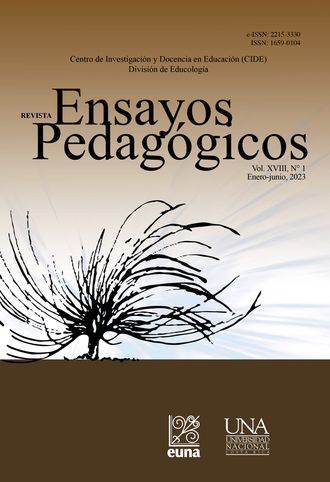Paradigmatic Reconciliation: Holistic Research
DOI:
https://doi.org/10.15359/rep.18-1.1Keywords:
Holism, reconciliation, research, scientific approachAbstract
When initiating a study, a researcher is likely to face the dilemma of selecting the paradigm and scientific approach that best suits his or her requirements and, even more so, to know that the available literature emphasizes research within the quantitative, qualitative and mixed paradigms. In contrast, a series of reflections are presented on holistic research based on the assumption that a conciliation or integration of paradigms allows novice researchers to find a valid option for the construction of the methodological framework, especially with regard to the application of appropriate data collection techniques and instruments which, in turn, contribute to the achievement of the objectives initially outlined. It is also relevant to consider within this discussion various contributions made by authors regarding epistemic models and the integrality achieved with holistic research in terms of the approach to events of interest to the researcher, assuming an integrative, explanatory and contextual attitude of the processes, avoiding as much as possible falling into the scientific reductionism that characterizes the paradigms of preference, beyond a simple combination of their characteristic techniques or those usually used in research under the so-called mixed approach.
References
Acevedo-Díaz, J. A., y García-Carmona, A. (2017). Controversias en la historia de la ciencia y cultura científica. Los libros de la Catarata.
Gluyas, R. I., Esparza, R., Romero, M. D. C. y Rubio, J. E. (2015). Modelo de Educación Holística: Una propuesta para la formación del ser humano. Actualidades Investigativas en Educación, 15(3), 462-486. https://doi.org/10.15517/aie.v15i3.20654
Gutiérrez, R. A. (2015). Investigación holística. Instituto Politécnico “Santiago Mariño”. https://www.academia.edu/19523855/Que_es_la_investigacion_holistica
Hernández-Sampieri, R. y Mendoza, C. P. (2018). Metodología de la investigación: las rutas cuantitativa, cualitativa y mixta. McGraw-Hill Interamericana.
Hurtado, J. (1998). Metodología de la investigación holística. SYPAL.
Hurtado, J. (2010). El proyecto de investigación. Comprensión holística de la metodología y la investigación. Quirón Ediciones & Sypal.
Martínez, M. (2011). El paradigma sistémico, la complejidad y la transdisciplinariedad como bases epistémicas de la investigación cualitativa. REDHECS: Revista Electrónica de Humanidades, Educación y Comunicación Social, 6(11), 6-27. https://dialnet.unirioja.es/servlet/articulo?codigo=4171976
Nivela, M. A., Echeverría, S. V. y Rivero, V. S. (2020). Construcción del conocimiento tecnológico con la metodología holística. Tse’De, 3(1), 1-13. http://tsachila.edu.ec/ojs/index.php/TSEDE/article/view/32
Ortiz, A. L. (2015). Epistemología y ciencias humanas: Modelos epistémicos y paradigmas epistemológicos. Ediciones de la U. https://www.researchgate.net/publication/315842011_Epistemologia_y_Ciencias_Humanas
Plata, D. (2006). Aproximación teórica a la investigación holística como herramienta metodológica en el contexto universitario. Multiciencias, 6(3), 244-249. https://www.redalyc.org/pdf/904/90460306.pdf
Pulido, V. M. (2015). Investigación holística en el sector salud [Presentación]. VI Congreso internacional de enfermería, Lima, Perú. http://repositorio.uigv.edu.pe/handle/20.500.11818/1219
Ramírez-Montoya, M. S. y Lugo-Ocando, J. (2020). Revisión sistemática de métodos mixtos en el marco de la innovación educativa. Comunicar: Revista Científica Iberoamericana de Comunicación y Educación, 65, 9-20. https://dialnet.unirioja.es/servlet/articulo?codigo=7555365
Salcedo, M., y Ortiz, A. (2016). Análisis epistémico del pensamiento configuracional. Investigaciones en Educación, 16(2), 97-118. https://revistaschilenas.uchile.cl/handle/2250/45790
Vallejos, Y. A. (2008). Forma de hacer un diagnóstico en la investigación científica. Perspectiva holística. Teoría y Praxis Investigativa, 3(2), 11-22. https://dialnet.unirioja.es/descarga/articulo/3700944.pdf
Vega, A. D. (2019). Perfil docente y práctica educativa, de los profesores del programa de instrumentación quirúrgica de la Universidad Popular del Cesar [Tesis de doctorado, Universidad Metropolitana de Educación, Ciencia y Tecnología]. Repositorio Digital UMECIT. https://repositorio.umecit.edu.pa/handle/001/2299
Velásquez, C. (2011). La investigación holística: Alternativa integradora en Ciencias Sociales. SABER. Revista Multidisciplinaria del Consejo de Investigación de la Universidad de Oriente, 23(2), 170-173. https://www.redalyc.org/pdf/4277/427739446011.pdf
Published
How to Cite
Issue
Section
License
Ensayos Pedagógicos is subscribed to the Attribution-NonCommertial-NoDerivatives 4.0 International Creative Commons Licence, which allows both authors and readers to freely download, store, copy, and distribute the final approved publisehd version of the manuscript (post-print) as long as this is done without commercial purposes, no derivative works are generated, and the source and author are mentioned. As well, Ensayos Pedagógicos declares that authors will remain the rightful owners of the copyrights of their work in perpetuity.







